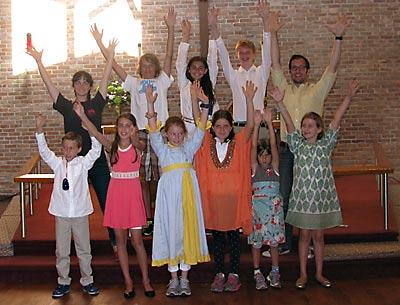Summer Shakespeare for Kids

Camp Shakespeare, a summer program for students between 8 and 15, will wrap up its 15th season on Friday with a 3:30 p.m. performance of “A Midsummer Night’s Dream” at St. Michael’s Lutheran Church in Amagansett, where the camp holds two weeklong sessions each summer.
“It’s difficult to find other theater nerds, so it’s great to come here and find people who share your interests,” said Tyler Thompson, a 13-year-old, after a successful performance of a half-hour version of “Romeo and Juliet,” in which he played Mercutio, on Friday, when the first camp session came to an end. The general mood among the actors before and after the performance was clearly one of excitement and happiness. Many said they were sad that the week was over and intended to be back next year.
Amelia Shapiro, who has attended the camp for seven years, said, “There’s an amazing sense of community here. It’s nice to be with people who like Shakespeare as much as I do.”
The camp is run by the Hamptons Shakespeare Theater Festival, which began presenting outdoor Shakespeare performances at Montauk County Park in 1996 and later offered full productions at Lake Agawam in Southampton, among other venues. Most popular with children of middle school age, the summer program has a devoted following. Nathaniel Greenlaw, who is 13 and played Romeo in last week’s production, came all the way from Wisconsin. “I needed more acting opportunities. Then I heard about this program. This is my second year,” he said.
According to David Brandenburg, the artistic director of the festival, “Shakespeare, for this age group, works really well. . . . We benefit from the fact that Shakespeare was meant to be performed, not just read. Getting it on its feet really opens it up to kids.” To help make their camp experience enjoyable, campers engage in improvisation, play movement games, do arts and crafts, and learn about the historic context of the plays they undertake. And, of course, they memorize lines.
Mr. Brandenburg said character development is a basic teaching tool. “I think that character is really the key for younger kids to get into the play, because the characters are so timeless and clear . . . on a basic level they are very approachable and understandable,” he said.
Putting together a production, even a short one, with only a week’s time, however, can be challenging, Enrico Spada, the director of Camp Shakespeare, said. “They can only memorize 20, 30, maybe 40 lines, and as the day approaches, we don’t want them to worry. So we don’t demand perfection.”
For each production, five or six scenes are chosen and linked with narration. “Romeo and Juliet” opened with a fight scene between the Montagues and the Capulets, and was followed by a few other well-known scenes, including Mercutio’s soliloquy about Queen Mab and the lovers’ tryst in the Capulet orchard.
Maizy Scarpa, one of the camp’s teachers, said the experience differs from other educational programs. “There is so much goal-oriented work these days, telling kids that they have to be the best all the time,” she said. “Camp Shakespeare is different because it gives kids a chance to play, but with structure . . . and encourages them to let their voices be present.”
During performances, Ms. Scarpa holds the book and helps the players, who are allowed to ask for their lines. In “Romeo and Juliet,” though, many of the players got through their lines, including lengthy soliloquies, without a problem.
In addition to Camp Shakespeare, the Hamptons Shakespeare Festival performs at schools and has internship programs for college students during the academic year.
